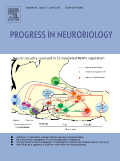
CURRENT OPINION IN NEUROBIOLOGY
Scope & Guideline
Uncovering Trends and Transformations in Neurobiology
Introduction
Aims and Scopes
- Neurodevelopment and Plasticity:
Research on the mechanisms of neural development, including cellular and molecular processes that guide neurogenesis, synapse formation, and circuit maturation. - Neurodegenerative Disorders:
Exploration of molecular and cellular mechanisms underlying neurodegenerative diseases such as Alzheimer's, Parkinson's, and schizophrenia, with a focus on potential therapeutic targets and interventions. - Behavioral Neuroscience:
Investigating the neural circuits and mechanisms that underpin behavior, cognition, and emotion, including studies on decision-making, addiction, and social behaviors. - Neuroimmunology:
Examining the interactions between the nervous system and the immune system, including the role of neuroinflammation in health and disease. - Computational Neuroscience and Modeling:
Utilization of computational models to understand neural dynamics, circuit function, and the integration of sensory information, with applications in both basic and applied neuroscience. - Ethology and Natural Behavior:
Studying the neural basis of natural behaviors across species, emphasizing the evolutionary context and ecological relevance of neural functions. - Stem Cell and Regenerative Neuroscience:
Research on the application of stem cell technologies to understand neural development and potential regenerative therapies for CNS injuries and diseases.
Trending and Emerging
- Interdisciplinary Approaches:
An increasing number of publications are integrating methods from various fields, including genetics, computational biology, and artificial intelligence, to address complex neurobiological questions. - Neuroinflammation and Immune Interactions:
There is a growing focus on the role of neuroinflammation and the interactions between the nervous and immune systems, particularly in the context of neurodegenerative diseases and mental health disorders. - Ethological and Naturalistic Studies:
Research emphasizing the study of naturalistic behaviors and ethological approaches is on the rise, reflecting a shift towards understanding behavior in ecological and evolutionary contexts. - Advancements in Neurotechnology:
Emerging technologies, such as optogenetics, advanced imaging techniques, and CRISPR-based methods, are increasingly being applied to explore neural circuits and their functions. - Focus on Sex Differences in Neuroscience:
There is a notable increase in research addressing sex differences in neural function and behavior, highlighting the importance of considering biological sex in neurobiological studies. - Machine Learning and Data-Driven Approaches:
The application of machine learning and data-driven methodologies to analyze neural data and model brain functions is becoming more prevalent, offering new insights into neural computation and behavior.
Declining or Waning
- Basic Neurophysiology:
While fundamental neurophysiological studies remain important, there has been a noticeable decline in papers focused solely on traditional neurophysiological methods without integrating more complex behavioral or computational approaches. - Historical Perspectives on Neurobiology:
Research articles that provide purely historical insights into neurobiology, without linking to contemporary issues or advancements, are becoming less common as the field trends toward more applied and interdisciplinary research. - Isolation of Neural Structures:
The focus on studying isolated neural structures or circuits in a reductionist manner is waning, as there is a growing emphasis on understanding neural networks and systems-level interactions. - Neuropharmacology of Traditional Drugs:
Research centered exclusively on the neuropharmacological effects of traditional drugs is decreasing, with a shift towards understanding polypharmacy and the impact of new therapeutic agents in complex disease models. - Single-Species Models:
There is a decline in studies using single-species models in favor of comparative approaches that consider multiple species to understand neural function and behavior in an evolutionary context.
Similar Journals

Molecular Brain
Unraveling the Mysteries of Neural Function at the Molecular LevelMolecular Brain is a prestigious open-access journal published by BMC, dedicated to advancing the field of neuroscience with a particular focus on cellular and molecular mechanisms. Since its inception in 2008, the journal has been committed to disseminating high-quality research that explores the intricate workings of the brain, particularly in areas related to cellular and molecular neuroscience. Located in the heart of London, England, Molecular Brain has garnered significant recognition in the academic community, boasting a 2023 categorization in the Q2 quartile for both Cellular and Molecular Neuroscience and Molecular Biology, reflecting its growing influence and relevance in these fields. With its Scopus ranks placing it in the top 32% and 38% of its respective categories, the journal serves as an essential platform for researchers, professionals, and students alike, encouraging collaboration and knowledge-sharing through its accessible online format.

PROGRESS IN NEUROBIOLOGY
Fostering Insights into Cognitive ProcessesPROGRESS IN NEUROBIOLOGY is a prestigious journal dedicated to advancing the field of neuroscience, published by Pergamon-Elsevier Science Ltd. With an impressive impact factor, it stands as a critical resource for researchers, professionals, and students alike, featuring rigorous peer-reviewed articles that explore the latest developments in neurobiology. The journal has established itself as a leading publication, ranked in the Q1 category for Neuroscience (miscellaneous) and holding a notable 13/113 rank in General Neuroscience per Scopus metrics, placing it in the top 12% of its field. Since its inception in 1959, PROGRESS IN NEUROBIOLOGY has covered a wide array of topics, from molecular mechanisms to cognitive processes, fostering a comprehensive understanding of brain functions. While the journal is not open access, it ensures accessibility to profound knowledge through institutional subscriptions. Researchers and scholars will find critical analyses and innovative research that are pivotal for both foundational knowledge and cutting-edge investigations in the neuroscience realm.

Eneurobiologia
Unlocking the Mysteries of the BrainEneurobiologia is an esteemed open-access journal published by UNIV VERACRUZANA, INST INVESTIGACIONES & EDUCACION, dedicated to advancing research in the vibrant field of neurobiology. With its launch in 2010, the journal aims to disseminate high-quality, peer-reviewed research articles that explore the complexities of neural systems, neurodevelopment, and neurodegenerative disorders. By providing a platform for both established researchers and emerging scholars, Eneurobiologia fosters interdisciplinary collaboration and knowledge exchange within the scientific community. Its open-access model ensures that valuable findings are accessible to a global audience, promoting the widespread application of neurobiological research. As a crucial resource for students, professionals, and researchers alike, Eneurobiologia plays a pivotal role in shaping the future of neurobiological studies and enhancing our understanding of the brain and nervous system.

Experimental Neurobiology
Elevating Neurobiological Research for a Healthier FutureExperimental Neurobiology is a prominent academic journal published by the Korean Society for Brain and Neural Science and the Korean Society for Neurodegenerative Disease, dedicated to advancing the field of neurobiology. With an ISSN of 1226-2560 and an E-ISSN of 2093-8144, this journal plays a pivotal role in disseminating innovative research findings from 2015 to 2024. The journal has established its relevance within the scientific community, achieving a Q3 ranking in Cellular and Molecular Neuroscience and a Q2 ranking in Neurology (Clinical) as of 2023. Researchers exploring the complexities of neurobiology will find a platform for their findings, as it currently holds a rank of #182 in clinical neurology and #73 in cellular and molecular neuroscience within the Scopus database. Although open access is not presently available, the journal remains committed to academic excellence and provides a critical resource for those engaged in the study of neurological diseases and mechanisms.

Frontiers in Neural Circuits
Driving Innovation in Sensory Systems ResearchFrontiers in Neural Circuits is a leading open-access journal dedicated to the rapidly advancing field of neuroscience, published by FRONTIERS MEDIA SA in Switzerland. Established in 2007, the journal has made significant strides in disseminating cutting-edge research through its commitment to open access, ensuring that groundbreaking discoveries are freely available to researchers, professionals, and students worldwide. With an impressive reputation, it occupies Q1 status across multiple categories, including Cellular and Molecular Neuroscience and Cognitive Neuroscience, reflecting its impact in these areas. Furthermore, its notable rankings within Scopus place it among the top journals, emphasizing its importance and influence, particularly in the domains of Sensory Systems and Neuroscience as a whole. By focusing on new findings related to neural circuitry and its implications for cognitive processes, Frontiers in Neural Circuits serves as an essential resource for anyone vested in advancing knowledge and understanding in the intricate field of neuroscience.

Brain and Behavior
Innovating Insights into Brain-Behavior Relationships.Brain and Behavior is a premier open-access journal published by WILEY, dedicated to advancing the field of Behavioral Neuroscience. With its ISSN 2162-3279, the journal has established itself as a vital resource for researchers, professionals, and students alike, fostering the dissemination of cutting-edge research since its inception in 2011. Renowned for its rigorous peer-review process, it enjoys a commendable Q2 ranking within the field, reflecting its impactful contributions and relevance in the scientific community. The journal not only emphasizes innovative studies that bridge behavioral science and neuroscience but also serves as a platform for diverse methodologies and interdisciplinary approaches. Accessible [open access](https://onlinelibrary.wiley.com/journal/21623279), Brain and Behavior invites submissions that explore the neural mechanisms underlying behavior, aiming to engage a global audience eager to expand the boundaries of knowledge in this dynamic field. Positioned in the heart of the United States, at 111 River St, Hoboken, NJ, it is strategically placed to collaborate with leading institutions and researchers worldwide.

Neuroscience Bulletin
Illuminating the complexities of brain science.Neuroscience Bulletin is a prestigious academic journal published by SPRINGER, focusing on the dynamic and interdisciplinary field of neuroscience. Established in 2005, this journal has consistently provided a platform for groundbreaking research, showcasing contributions that span various aspects of neuroscience, physiology, and medicine. With an admirable impact factor and recognition as a Q1 journal in both Medicine and Neuroscience categories for 2023, it ranks highly in the Scopus metrics, reflecting its importance in advancing scientific knowledge and practice. Researchers and professionals alike benefit from its cutting-edge articles, which are accessible through traditional subscription models. The Neuroscience Bulletin plays a crucial role in disseminating significant findings and fostering collaboration within the global research community, making it an essential resource for anyone engaged in the exploration of neural mechanisms, treatments, and innovations.

Frontiers in Systems Neuroscience
Bridging gaps in neural function and behavior.Frontiers in Systems Neuroscience is a premier open-access journal published by FRONTIERS MEDIA SA, dedicated to advancing the understanding of the complex systems that underpin neural function and behavior. Established in 2007 and based in Switzerland, this journal has gained recognition for its rigorous peer-reviewed articles that contribute significantly to the fields of Cellular and Molecular Neuroscience, Cognitive Neuroscience, and Developmental Neuroscience. As of 2023, it proudly holds a Q2 ranking in several neuroscience categories, reflecting its high impact and relevance in the academic community. The journal is accessible to researchers, professionals, and students worldwide, providing a platform for innovative research while promoting collaborative scientific dialogue. With a commitment to open access, Frontiers in Systems Neuroscience ensures that groundbreaking findings are readily available to enhance knowledge sharing across the globe. This makes it an essential resource for anyone looking to stay at the forefront of neuroscience research.

NEUROSCIENCE
Pioneering research shaping the future of brain science.NEUROSCIENCE, published by PERGAMON-ELSEVIER SCIENCE LTD, has established itself as a reputable journal in the field of neuroscience since its inception in 1976, continuing its contributions through 2024. With a Category Quartile ranking of Q2 in Neuroscience (miscellaneous) and a Scopus Rank of #41 out of 113, this journal represents a critical platform for the dissemination of innovative research and insights. Although it currently does not offer open access options, NEUROSCIENCE aims to advance our understanding of the nervous system by publishing high-quality original research, reviews, and methodological articles, thereby engaging a comprehensive audience of researchers, professionals, and students alike. With an impact factor that reflects its significance in the scientific community, this journal remains a go-to source for cutting-edge discoveries and scholarly discussions in the dynamic field of neuroscience.

CEREBRAL CORTEX
Pioneering research in cognitive and molecular neuroscience.CEREBRAL CORTEX, published by Oxford University Press Inc, is a premier journal dedicated to advancing the field of neuroscience, specifically focusing on the cellular, molecular, and cognitive aspects of cortical structure and function. With an impressive impact factor that situates it in the top quartile (Q1) of its categories for 2023, this journal holds significant relevance for researchers and professionals interested in the latest discoveries and methodologies in both Cognitive Neuroscience (ranked #31 out of 115) and Cellular and Molecular Neuroscience (ranked #48 out of 97). Operating without an open access model, it ensures rigorous peer review and dissemination of high-quality research from across the globe. Since its inception in 1991, CEREBRAL CORTEX has established itself as a critical platform for educators and inventors, pushing the boundaries of knowledge in understanding brain function and its implications for behavior. Researchers and students alike will find this journal an invaluable resource for both foundational and cutting-edge studies in neuroscience.